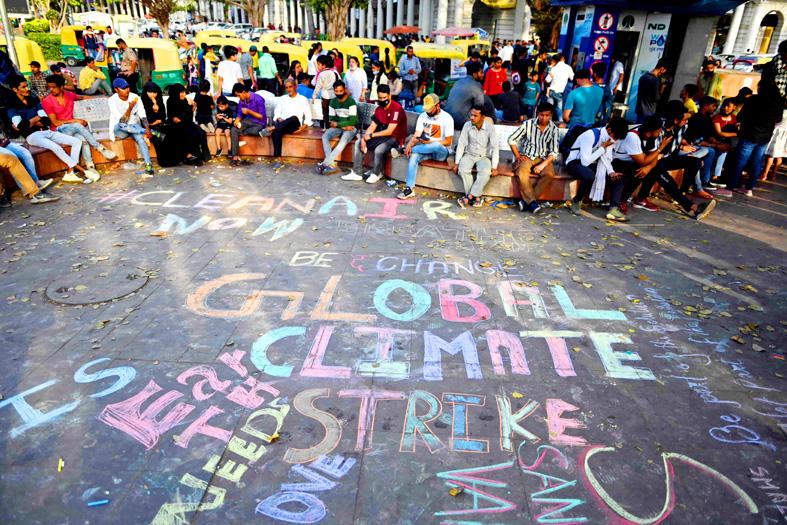The world is “sleepwalking to climate catastrophe,” with major economies allowing carbon pollution to increase when drastic cuts are needed, UN Secretary-General Antonio Guterres said yesterday.
The goal of capping global warming at 1.5°C is already “on life support,” he told a sustainability conference in London organized by The Economist.
Keeping 1.5°C in play requires a 45 percent drop in emissions by 2030 and carbon neutrality by mid-century, the UN’s Intergovernmental Panel on Climate Change (IPCC) said.

Photo: AFP
Even if nations honor newly revised pledges under the Paris Agreement, emissions are still set to rise 14 percent before the decade ends.
“The problem is getting worse,” Guterres said in a pre-recorded video message. “We are sleepwalking to climate catastrophe.”
“If we continue with more of the same, we can kiss 1.5C goodbye,” he added. “Even two degrees may be out of reach.”
His comments came only hours before the 195-nation IPCC starts a two-week meeting to validate a landmark report on options for reducing carbon pollution and extracting CO2 from the air. The report is expected to conclude that CO2 emissions must peak within a few years if the Paris temperature targets are to be met.
Guterres described COVID-19 recovery spending as “scandalously uneven” and a missed opportunity to accelerate the turn toward clean energy.
The Russian invasion of Ukraine, could further derail climate action with importers locking in fossil fuel dependence as they scramble to replace Russian oil and gas, he added.
“Countries could become so consumed by the immediate fossil fuel supply gap that they neglect or knee-cap [climate] policies,” Guterres said.
“This is madness. Addiction to fossil fuels is mutually assured destruction,” he said.
A bombshell report last year from the intergovernmental International Energy Agency concluded that a 1.5°C world was incompatible with any new oil or gas developments, or new coal-fired power plants.
Breaking with the usual practice of not singling out countries, Guterres called out Australia and a “handful of holdouts” for failing to lay out “meaningful” near-term plans to slash emissions.
He also said the development needs and economic structures of China, India, Indonesia and other “emerging economies” prevent them from making similar commitments, especially on coal.
Rich nations should provide money, technology and knowhow to help these emerging economies purge coal from their energy portfolios, he added, pointing to a pathbreaking deal for South Africa unveiled at the COP26 climate summit in Glasgow in November last year.
“Our planet can’t afford a climate blame game,” he said. “We can’t point fingers while the planet burns.”
Wealthy nations in the Organisation for Economic Co-operation and Development must phase out coal by 2030, and all other countries by 2040, Guterres said.
China and India — both heavily reliant on coal — have resisted a full embrace of the 1.5°C goal, along with pressure to set more ambitious short-term emissions reduction targets.
Both nations have set long-term “net zero” goals for carbon neutrality, 2060 for China and 2070 for India.
G20 countries account for about 80 percent of global greenhouse gas emissions.
A landmark IPCC report on climate impact and humanity’s capacity to adapt, published last month, details an atlas of human suffering and warned that far worse is to come.
Unprecedented floods, heatwaves and wildfires seen across four continents in the last year would all accelerate in coming decades even if the fossil fuel pollution is rapidly brought to heel, the report concluded.

Intel Corp chief executive officer Lip-Bu Tan (陳立武) is expected to meet with Taiwanese suppliers next month in conjunction with the opening of the Computex Taipei trade show, supply chain sources said on Monday. The visit, the first for Tan to Taiwan since assuming his new post last month, would be aimed at enhancing Intel’s ties with suppliers in Taiwan as he attempts to help turn around the struggling US chipmaker, the sources said. Tan is to hold a banquet to celebrate Intel’s 40-year presence in Taiwan before Computex opens on May 20 and invite dozens of Taiwanese suppliers to exchange views

Application-specific integrated circuit designer Faraday Technology Corp (智原) yesterday said that although revenue this quarter would decline 30 percent from last quarter, it retained its full-year forecast of revenue growth of 100 percent. The company attributed the quarterly drop to a slowdown in customers’ production of chips using Faraday’s advanced packaging technology. The company is still confident about its revenue growth this year, given its strong “design-win” — or the projects it won to help customers design their chips, Faraday president Steve Wang (王國雍) told an online earnings conference. “The design-win this year is better than we expected. We believe we will win

Chizuko Kimura has become the first female sushi chef in the world to win a Michelin star, fulfilling a promise she made to her dying husband to continue his legacy. The 54-year-old Japanese chef regained the Michelin star her late husband, Shunei Kimura, won three years ago for their Sushi Shunei restaurant in Paris. For Shunei Kimura, the star was a dream come true. However, the joy was short-lived. He died from cancer just three months later in June 2022. He was 65. The following year, the restaurant in the heart of Montmartre lost its star rating. Chizuko Kimura insisted that the new star is still down

While China’s leaders use their economic and political might to fight US President Donald Trump’s trade war “to the end,” its army of social media soldiers are embarking on a more humorous campaign online. Trump’s tariff blitz has seen Washington and Beijing impose eye-watering duties on imports from the other, fanning a standoff between the economic superpowers that has sparked global recession fears and sent markets into a tailspin. Trump says his policy is a response to years of being “ripped off” by other countries and aims to bring manufacturing to the US, forcing companies to employ US workers. However, China’s online warriors